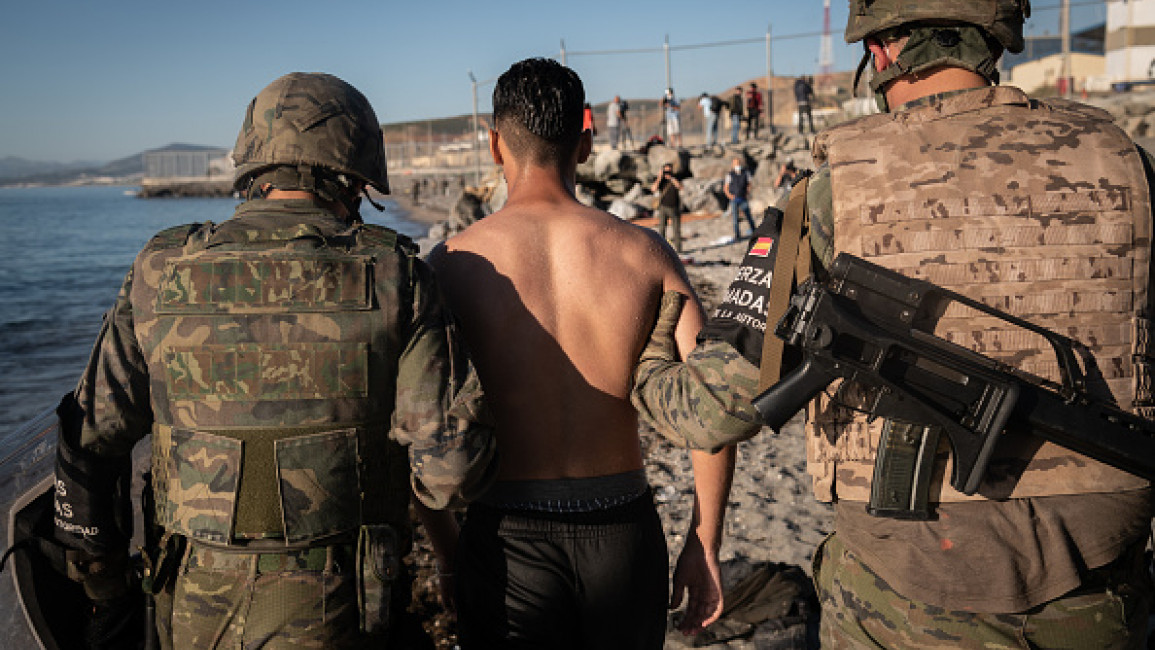Why are hundreds of children fleeing Morocco and heading to Spain?
In Morocco, thousands—including children—are making their way north in another attempt to head to Spain, as Rabat faces allegations of using extensive violence to control the unprecedented flux.
This saga began in late August when a slew of TikTok videos emerged, offering tips and tricks for crossing the perilous six-kilometre swim across the Strait of Gibraltar to the Spanish enclave of Ceuta.
In response, thousands of would-be migrants from various cities in the kingdom set off towards Fnideq, near Tangier, seeking refuge behind hills and along roads to evade the authorities.
Security forces' attempts to halt these crossings have led to dozens of migrants throwing stones at police while trying to breach the barriers.
According to local authorities, 4,455 potential migrants were detained between 11 and 16 September, comprising 3,795 adults, 141 minors, and 519 foreign migrants, primarily from Algeria and sub-Saharan countries.
Rabat reported thwarting six attempts at mass crossings, although a couple of individuals managed to slip through over the weekend, only to be deported back to Morocco.
On 30 September, another wave of hopefuls is set to attempt the crossing, spurred on by a social media campaign.
Why the mass migration wave in Morocco?
Migration isn't a new phenomenon in Morocco; like many African nations, the youth are captivated by the prospect of leaving for Europe, enticed by better job opportunities, higher salaries, and greater freedoms.
It's something, rappers and Rai singers sing about in national festivals. Even Moroccan Prime Minister Aziz Akhennouch has been seen lately dancing in his party's rally to a rap song about unemployment and youth's desire to escape. He faced backlash, and the rapper said he wasn't asked permission to use his song.
However, Morocco has rarely experienced such large-scale, organised attempts. Typically, there are just a handful of migrants on boats or swimming in small groups.
While Rabat hasn't put forth an official narrative, its media outlets have already pointed fingers at foreign powers, particularly its staunch enemy: Algeria.
Alejandro Ramírez, the spokesperson for the Ceuta government, has also insisted that this wave "could not be spontaneous," demanding an investigation into the social media calls for migration.
Moroccan authorities have arrested seventy suspects for inciting this migration, "including individuals from abroad," they didn't articulate further.
However, local activists and official reports challenge this narrative.
"Most young people we spoke to want to help their families build decent homes or secure stable incomes, or assist with medical costs for chronic illnesses", explained AbdelRahim Belchkar, journalist and activist in North Morocco. "They just want better lives."
Reports from official institutions like Morocco's High Commission for Planning highlight a deepening social crisis. A memorandum published last May revealed that 25 per cent of Moroccan youth aged 15 to 24—approximately 1.5 million—are neither employed nor engaged in education.
'TikTok migration'
While platforms like TikTok aren't the sole catalysts behind this migration wave, they have undeniably reshaped the migration landscape in Morocco, and globally.
"I have always wanted to leave this country, but I could not afford to go on a boat," said a young Moroccan woman in the condition of anonymity, fearing the mass arrests against hopeful migrants.
"I learned on TikTok how to swim to Ceuta (...) how to survive the journey," who says she wants to leave the country for a better life. Asked if she would join the mass attempt by the end of the month, she refrained from answering.
Young Moroccans are creating a vast digital record of their journeys to Spain, meticulously documenting routes and challenges so that some can navigate independently, without paying hefty sums to smugglers. Many have found fame as influencers; take Chaimae, for instance, a Moroccan woman who successfully crossed to Spain and has since garnered over 200,000 followers on TikTok – under the username "cha_imae17" – sharing advice on traversing the Gibraltar Strait and inspiring others to embark on the journey.
"This [wave] illustrates the tragedy of youth living in such despair that they would rather risk death than stay in Morocco", wrote the content creator, after facing backlash for "romanticising migration" to a young audience.
How are Morocco and Spain handling the crisis?
In response to this migration surge, Morocco deployed hundreds of police and auxiliary forces in Fnideq and Nador, near Melilla, Spain's other enclave. Morocco's Association of Human Rights (AMDH) reported that local authorities have arbitrarily arrested dozens of young people and closed beaches to the public in the area.
The NGO argues that "the unprecedented militarisation of the borders is unnecessary" and merely "a show to impress Spanish authorities."
Images of young naked men in distress, some bearing bruises, reportedly arrested after attempting to cross the borders, have sparked outrage among local and international activists.
Morocco said has opened an investigation into these pictures, promising transparency and accountability for those responsible.
On 18 September, Spain's Foreign Minister José Manuel Albares praised Moroccan-Spanish cooperation on migration, but conveniently sidestepped the allegations of mistreatment facing Rabat.
The Moroccan government has yet to address the crisis.
This is not the first time Rabat and Madrid pursue a deadly migration policy.
In 2022, Moroccan and Spanish authorities killed at least 20 sub-Saharan migrants at the Melilla borders, according to local and international NGOs' findings. Both states have denied the allegation, claiming that migrants died of "mechanical asphyxia."
Morocco has long refused to play the role of "immigration gendarmes to protect the European border," in the words of Moroccan Foreign Minister Nasser Bourita.
However, things have changed since March 2022, when Madrid shifted policy and supported Morocco's plan for autonomy in the disputed territory of Western Sahara—a vital diplomatic file for Rabat.




 Follow the Middle East's top stories in English at The New Arab on Google News
Follow the Middle East's top stories in English at The New Arab on Google News
![The US vetoed a UN Security Council (UNSC) resolution demanding a ceasefire in Gaza [Getty]](/sites/default/files/styles/image_330x185/public/2185152251.jpeg?h=7ef8ac04&itok=RpLSj2pu)

![An attack by paramilitary forces in Sudan has killed at least 40 people [Getty]](/sites/default/files/styles/image_330x185/public/2182364341.jpeg?h=a5f2f23a&itok=r8Fkhxdj)